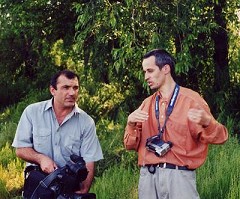 |
 |
|||||||
|
|
||||||||
| Director The Soviet Union and different underground movements (especially the Church) were always interesting themes for me. When I read the famous autobiography Forgive Me Natasha, I understood that it was a very captivating story about a contemporary hero who sacrificed his life for his beliefs. The history of Sergei Kourdakov (as it is written in the book) shows the tragedy of individuals who try to fight against totalitarian systems. My advisor, where I was studying documentary film in Moscow, told me that this book is much more of a story for a motion picture drama than for a documentary, but I still wanted to make the documentary film. I understood that the book was written in the United States and might contain faulty details; this was understandable because it was written for people who lacked information about Soviet Union. However, on the first film shoot, I recognized that the book was much further from the truth than what I had first thought and might simply be fiction. At this time, I met a young American, Caroline Walker, who had the same interest, but her inspiration was religious: she wanted to tell the story of a contemporary Saint Paul because she believed God had called her to. I first met Caroline the spring of 2000 in Moscow after corresponding a couple months via email. As I was packing my bags for the first shoot in Petropavlovsk-Kamchatsky, she told me how God had given her a vision one day in 1995 when praying about adapting Sergei’s story to the screen. She said that she saw in her mind’s eye herself as a pen in God’s hand. From this moment (hoping Caroline would agree to let me film her journey) I started to produce “three different films” at the same time: a film based on the book Forgive Me, Natasha, a film based on the contradictory information that we found during the investigation, and a film based on the spiritual development of Caroline Walker. Naturally, the last theme was the most interesting to me. Yet this goal was very difficult because it is very complicated to show the internal, spiritual world of any human being. My main focus was how the heroine can go through a crisis of faith in such a “dark night of the soul” where God seems to be hiding His face. This experience is somewhat universal - especially in Christian spirituality – but we never know what the result will be. In post production, the most difficult task was to put together these “three films” so that the audience could understand all dramatic lines. |
||
